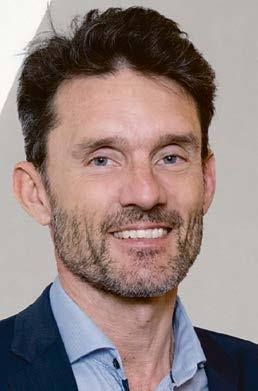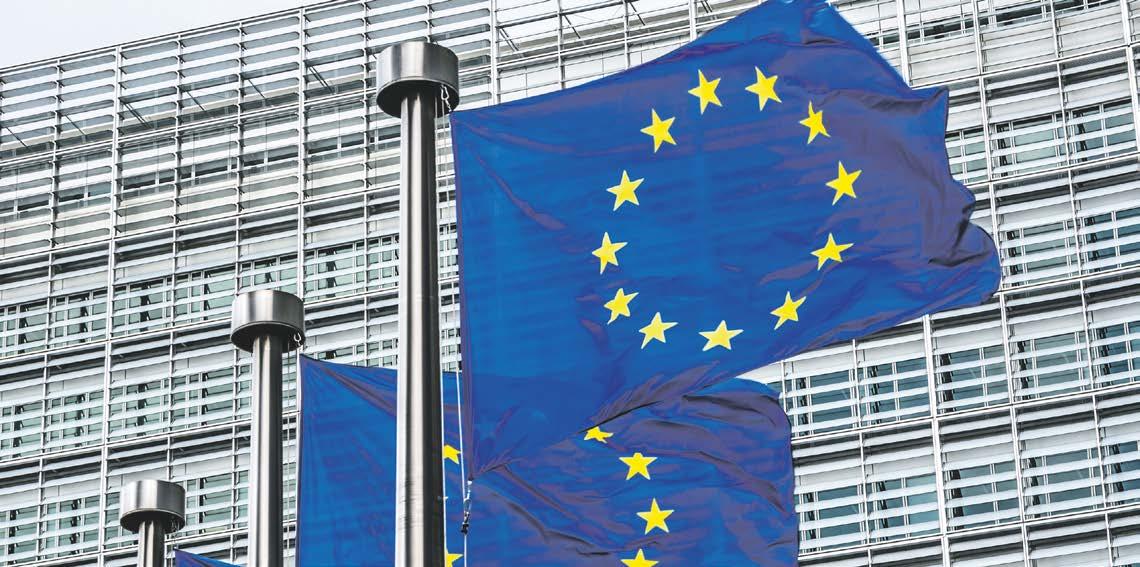
4 minute read
nordic business
from Nordic Business
Executive Editor & Publisher
Henning Andersen
Editor & CCO
Julie Brix
Journalists/Contributors
Bibi Christensen, Sten Thorup Kristensen
Kåre Peitersen, Trine Østergaard
Art Director:
Heidi Carlsen
Graphic production
Majbritt Høger
Sales
Partnermedier ApS
Dear Reader
Welcome to Nordic Business. This magazine was created in a great collaboration of experienced and competent business journalists and highly insightful experts, with the vision of gathering and sharing information and insights relevant to Nordic leaders.
Nordic business leaders face many of the same demands, such as transforming Nordic companies into more agile entities while still creating sustainable growth.
Fortunately, many businesses in the Nordic countries are already performing really well each on their own, but when they convene in various categories, they are capable of reaching great flying heights internationally. That is why it is essential that we stay informed of developments across our Nordic neighbours and see the opportunities for expanding and continuing our strong cross-border cooperation.
With these words, we hope that with Nordic Business you will gain even greater insight into Nordic commerce and industry.
Julie Brix Editor & CCO

Cover Photo
Copyright Ministry of Digitization and Gender Equality
Photographer Anni Norddahl
Printconnect ApS
Contact nordic@partnermedier.dk
Nordic Business is published by Partnermedier St. Kongensgade 59 A, 4. sal 1264 Kbh. K
Next issue published: 28th September 2023
Tangente neomatik blue gold. A deep radiance and the highest precision define this model of the NOMOS icon—straightforward and at the same time with a desire for the extraordinary. The slender DUW 3001 automatic caliber, manufactured in Glashütte, ticks away on the inside. Technical excellence does not get any more elegant—or more comfortable to wear. Available with a diameter of 35 or 39 millimeters at select retailers in Finland (Helsinki: Aseman Kello; Vaasa: Hovisepät ), in Norway (Oslo: Thune; Rådal: Thune; Sandefjord: Naess; Stavanger: Otteren; Strømmen: Thune; Trondheim: Håkon Lian ), and in Sweden (Stockholm: Franks Ur ). As well as here: nomos-glashuette.com
NEW ESG DIRECTIVE ADOPTED - IT IS IMPORTANT THAT DANISH COMPANIES ARE READY

Some of the areas for which large companies in the EU must in future collect and present data include: climate impact, pollution, water consumption, wastewater management, biodiversity, working conditions among employees and in the supply chain, diversity, and anti-corruption.
Also, the companies must publish concrete KPIs and indicate how they are working to fulfil them.
This is stated by the European Parliament with a new directive for CSR reporting, the Corporate Sustainability Reporting Directive (CSRD), which was adopted on 10 November and aims to oblige companies in the EU to uniform and reliable reporting on sustainability.
With the new directive, around 50,000 companies in the EU will in future publish data for their societal and environmental impacts. In reality, however, the directive will eventually affect small and medium-sized companies as well.
Ellen Marie Friis Johansen, CSR Manager at Dansk Erhverv, says, ‘It can be an advantage to already familiarize yourself with these rules now, so that you don't hit a wall at 120 kilometres per hour when the flexible framework is transformed into fixed rules.’ says
Rules should be proportional
According to both Ellen Marie Friis Johansen and Filip Marott Sundram, Head of Audit, it is good to have reporting standards that are sufficiently clear, focused, and operational so that companies
In 2024, all large companies in the EU must be transparent regarding their social and environmental impacts as the European Parliament has just adopted a new directive on sustainability reporting

ELLEN MARIE FRIIS JOHANSEN, CSR MANAGER AT DANSK ERHVERV
‘It can be an advantage to already familiarize yourself with these rules now, so that you don’thit a wall at 120 kilometres per hour when the flexible framework is transformed into fixed rules.’

‘Danish Erhverv welcomes the improvements and also recognizes that the quality has improved. But it will be a very big task for the companies, and we are concerned that too many resources are being spent on reporting rather than the really important task – which is the green transition.’ can work with them. It is just as crucial that the standards are also proportional, so that a real green transition does not drown in paperwork.

In May 2021, the EU Commission asked EFRAG to develop reporting standards for sustainability: the so-called ESRS (European Sustainability Reporting Standards). EFRAG is a private EU organization which advises the Commission on international accounting standards for use in the EU. EFRAG sent a revised draft of the standards on 22 November.

Dansk Erhverv was pleased to note that the concerns of business have been listened to and that the reporting requirements have been reduced slightly from the draft EFRAG sent out for public consultation in the summer of 2022. The number of information requirements has been reduced and the number of data points has been almost halved from the original draft and is now reduced to 1,144. ‘Danish Erhverv welcomes the improvements and also recognizes that the quality has improved. But it will be a very big task for the companies, and we are concerned that too many resources are being spent on reporting rather than the really important task – which is the green transition,’ says Filip Marott Sundram,. Having said that, it is important to emphasize that Dansk Erhverv supports the CSRD directive.
‘I hope that it will be possible for companies to see the value in CSRD and use it as a tool in the sustainable transition,’ Says Ellen Marie Friis Johansen. ‘There are many positive gains to be made by achieving uniformity in EU companies' sustainability information, which investors and other stakeholders need, even if the ESG task can be difficult to carry out. Strategic use of CSRD can prove to be an advantage for Danish companies, because they are some of the best in the world at green transition.’ says The new rules are comprehensive and the burden is heavy. Dansk Erhverv, in collaboration with FSR – Danish Auditors, is therefore launching a new information effort, 'the sustainable reporting track', on 1 December. Initially, it is about giving companies an overview of all the regulations that are coming – and later on there will be an opportunity to gain more knowledge in the individual areas.
Expected to be adopted before December
The European Council is expected to adopt the proposal on 28 November, and the directive will be effective 20 days after its publication. The rules will be continuously phased in for financial years that begin:
• 1 January 2024 for listed companies with more than 500 employees.
• 1 January 2025 for listed and non-listed companies with more than 250 employees.
• 1 January 2026 for small listed companies.










